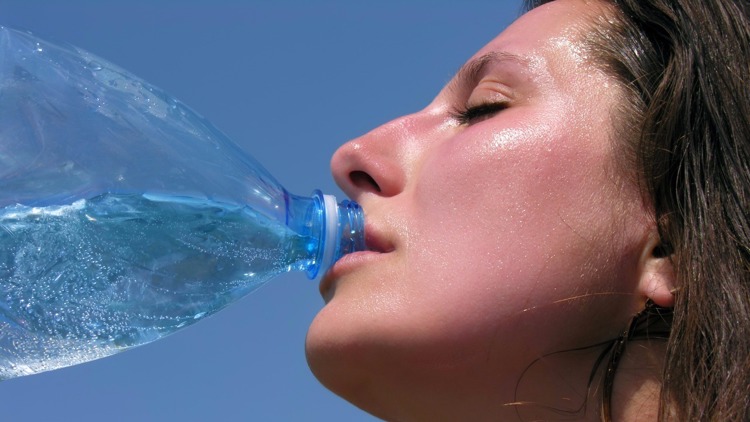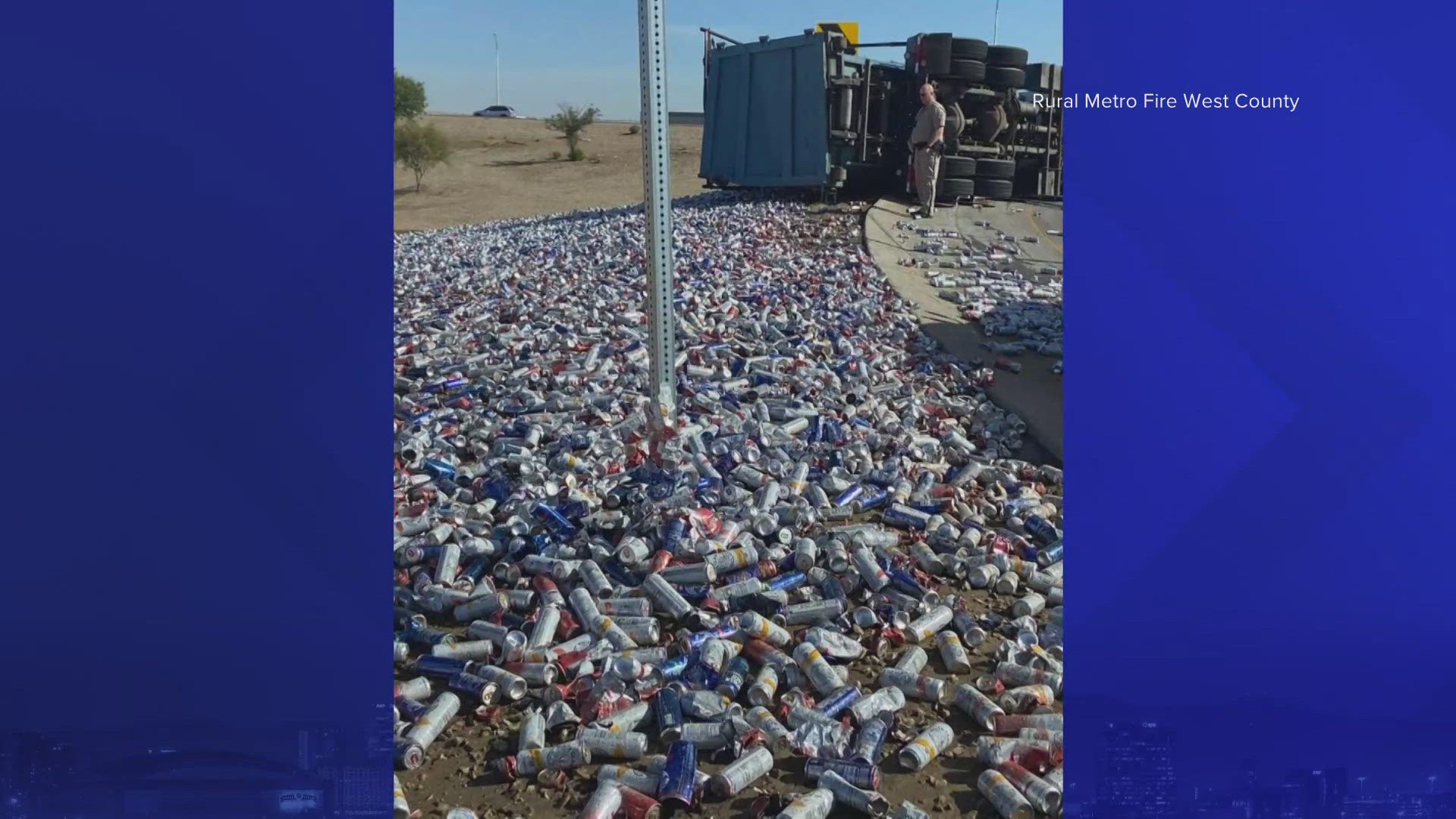PHOENIX — You've heard it before and you'll hear it again, Phoenix: Drink more water.
When the weather is hot and the air is dry, Valley residents run the risk of becoming dehydrated often and quickly. Here's what you need to know about everything dehydration.
What is dehydration?
Dehydration occurs when you lose so much body fluid that your body does not function properly and often happens when you are losing more fluids than you are taking in, according to the Cleveland Clinic.
For some people — such as infants and children, older adults, people with chronic illnesses, and people who work or exercise outside — dehydration poses a greater risk, as well, according to the Mayo Clinic.
Dehydration is common on hot days, especially if you sweat a lot. And since pretty much every day is hot in Phoenix during the summer months, dehydration is at the top of many minds in the Valley.
Dehydration symptoms
Some of the common dehydration symptoms include:
- Feeling thirsty
- Headache
- Tiredness
- Flushed skin
- Dizziness, weakness or lightheadedness
However other symptoms of dehydration could be harder to spot because they are similar to symptoms of different conditions and diseases. Plus, you can be dehydrated not just in the heat, but also when you are sick and have a fever, vomit, or have diarrhea, or are using a medication that increases urination.
- Dry mouth or a dry cough
- High heart rate but low blood pressure
- Sugar cravings
- Loss of appetite
- Swollen feet
- Muscle cramps
- Chills
- Constipation
- Dark-colored urine
- Nausea and vomiting (usually caused by headache)
Severe dehydration can lead to its own set of symptoms, including electrolyte imbalances, heatstroke or other heat-related illnesses, kidney issues like kidney stones and kidney failure, shock, coma, seizure, or even death, the Cleveland Clinic explains.
Children also have different symptoms than adults, the Mayo Clinic said. Their symptoms can include:
- Dry mouth and tongue
- No tears when crying
- No wet diapers for three hours
- Sunken eyes or cheeks
- Sunken soft spot on top of skull
- Listlessness or irritability
Treating, preventing dehydration
But before you run and drink a gallon of water, let's break down the levels of dehydration and what is best to do at each level.
Mild dehydration is what healthcare professionals categorize as dehydration that can be fixed by ingesting more fluids orally. Make sure to drink more water and liquids with electrolytes to replenish your body. According to the Cleveland Clinic, you should feel better within five to ten minutes.
Moderate dehydration often requires an IV to get hydration into your system through your veins. The Cleveland Clinic says you can get an IV from an urgent care, emergency room or hospital.
Severe dehydration is when you need to call 911 immediately or go to an emergency room.
As you are rehydrating, start small: drinking a few sips of water at a time or sucking on ice cubes can be a good place to start, according to the Icahn School of Medicine at Mount Sinai. You can also try popsicles or dilute fruit juices with water to prevent an upset stomach while rehydrating, according to an article from Harvard Medical School.
You can also be chronically dehydrated, which occurs when you are consistently losing more water than you are taking in over a long period, according to an article from Medical News Today. This can happen to people who aren't drinking enough fluids, not eating enough foods high in water content, people exposed to excessive heat, people who are vomiting for prolonged periods of time, or people who are taking diuretic medications.
Remember, dehydration is not cured overnight: it often takes people multiple days to feel better after experiencing even mild dehydration.
Dehydration can cause... what??
If you take to social media, you'll find a whole lot of other symptoms users have experienced with the heat and dehydration. That being said, some of the symptoms folks attribute to dehydration also could be symptoms of other unique Arizona qualities, such as elevation, UV rays, and barometric pressure.
While not all are very scientific or backed by medical providers, here are a few dehydration issues people shared online:
- Gastrointestinal distress: Some Reddit users on an "r/ibs" thread found solace in knowing other people also have problems with their bowels on hot summer nights. Users commented on everything from increased constipation or diarrhea to heat making IBS symptoms worse overall. An article from Well+Good suggests that lack of proper water intake and an increase in sugary or caffeinated beverages can also contribute to bathroom woes during hot weather.
- Skin issues: Some Reddit users reported their skin got worse during the summer months in Phoenix, citing increased sweating impacting acne and overall having less hydrated skin. Some users mentioned hard water causing issues for their skin while others mentioned various oils and products they found helpful in keeping their skin hydrated. Dry skin is listed as a symptom of dehydration in an article from Johns Hopkins, too.
- Increased anxiety: Yes, some Reddit users in the "r/anxiety" thread reported dehydration contributing to increased feelings of anxiousness. Some users even said anxiety and dehydration often go hand in hand: when they are anxious, they feel a loss of appetite, which leads to not drinking enough water and then anxiety about not drinking enough water.
- Odd colored urine: If you thought it was just number two impacted by a lack of water intake, you're, well, out of luck... if you know what we mean. When you're dehydrated, your urine can appear deep yellow, orange, or any other color than the healthy one, a pale yellow.
- Brain fog: Some Reddit users in an "r/hydrohomies" thread reported experiencing brain fog and other neurological responses to dehydration. Everything from passing out to difficulty walking was mentioned in this thread, reminding folks that dehydration can have similar symptoms to many illnesses.
Watch 12News+ for free
You can now watch 12News content anytime, anywhere thanks to the 12News+ app!
The free 12News+ app from 12News lets users stream live events — including daily newscasts like "Today in AZ" and "12 News" and our daily lifestyle program, "Arizona Midday"—on Roku and Amazon Fire TV.
12News+ showcases live video throughout the day for breaking news, local news, weather and even an occasional moment of Zen showcasing breathtaking sights from across Arizona.
Users can also watch on-demand videos of top stories, local politics, I-Team investigations, Arizona-specific features and vintage videos from the 12News archives.
Roku: Add the channel from the Roku store or by searching for "12 News KPNX."
Amazon Fire TV: Search for "12 News KPNX" to find the free 12News+ app to add to your account, or have the 12News+ app delivered directly to your Amazon Fire TV through Amazon.com or the Amazon app.
Up to Speed
Catch up on the latest news and stories on the 12News YouTube channel. Subscribe today.



